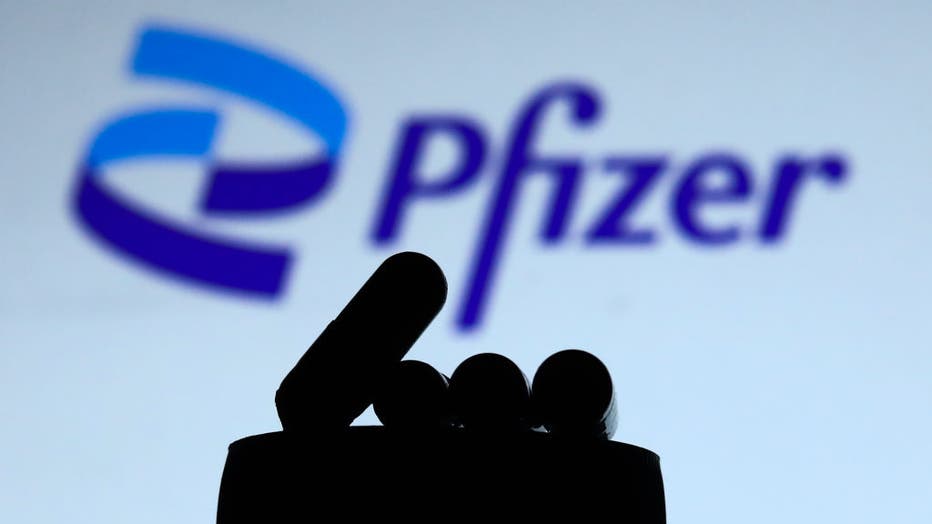Pfizer COVID-19 pill approved in US as 1st home treatment
NEW YORK - U.S. health regulators on Wednesday authorized the use of Pfizer’s antiviral pill, the first COVID-19 treatment that Americans can pick up at a pharmacy and take at home to head off the worst effects of the virus.
The drug, Paxlovid, is a faster, cheaper way to treat early COVID-19 infections, though initial supplies will be extremely limited. All of the previously authorized drugs against the disease require an IV or an injection.
An antiviral pill from Merck is also expected to win authorization soon. But Pfizer's drug is all but certain to be the preferred option because of its mild side effects and superior effectiveness, including a nearly 90% reduction in hospitalizations and deaths among patients most likely to get severe disease.
"The efficacy is high, the side effects are low and it’s oral. It checks all the boxes," said Dr. Gregory Poland of the Mayo Clinic. "You’re looking at a 90% decreased risk of hospitalization and death in a high-risk group — that’s stunning."
The Food and Drug Administration authorized Pfizer's drug for adults and children ages 12 and older with a positive COVID-19 test and early symptoms who face the highest risks of hospitalization. That includes older people and those with conditions like obesity and heart disease. Children eligible for the drug must weigh at least 88 pounds.
The company asked the FDA on Nov. 16 to authorize its pill for COVID-19, setting the stage for a likely launch this winter. Before receiving authorization, Pfizer said earlier this month that its pill appeared effective against the omicron COVID-19 variant.
Pfizer said the full results of its 2,250-person study confirmed the pill’s promising early results against the virus: The drug reduced combined hospitalizations and deaths by about 89% among high-risk adults when taken shortly after initial COVID-19 symptoms.

FILE - Medicine pills are seen with Pfizer logo in the background in this illustration photo. CREDIT: Jakub Porzycki/NurPhoto via Getty Images
RELATED: COVID-19 surge: Here’s what’s canceled or closing across the US
Separate laboratory testing shows the drug retains its potency against the omicron variant, the company announced, as many experts had predicted. Pfizer tested the antiviral drug against a man-made version of a key protein that omicron uses to reproduce itself.
President Joe Biden called Pfizer’s drug "another potentially powerful tool in our fight against the virus," in a statement.
The U.S. government has agreed to purchase enough of Pfizer’s drug to treat 10 million people. But company executives have indicated that initial supplies will be limited, with only enough to treat tens of thousands of people before the end of the year. By March Pfizer hopes to ramp up production to provide millions of courses of treatment.
RELATED: Israel to ban travel to US, Canada due to omicron variant concerns
Across both of Pfizer’s studies, adults taking the company’s drug had a 10-fold decrease in virus levels compared with those on placebo.
The prospect of new pills to fight COVID-19 can’t come soon enough for communities in the Northeast and Midwest, where many hospitals are once again being overloaded by incoming virus cases.
Both the Merck and Pfizer pills are expected to perform well against omicron because they don’t target the coronavirus’ spike protein, which contains most of the new variant’s mutations.
Meanwhile, omicron has raced ahead of other variants and is now the dominant version of the coronavirus in the U.S., accounting for 73% of new infections last week, federal health officials said Monday. Data from the U.S. Centers for Disease Control and Prevention showed nearly a six-fold increase in omicron's share of infections in only one week.
CDC Director Dr. Rochelle Walensky said the new numbers reflect the kind of growth seen in other countries.
"These numbers are stark, but they’re not surprising," she said.
Scientists in Africa first sounded the alarm about omicron less than a month ago and on Nov. 26 the World Health Organization designated it as a "variant of concern." The mutant has since shown up in about 90 countries.
Much about the omicron variant remains unknown, including whether it causes more or less severe illness. Early studies suggest the vaccinated will need a booster shot for the best chance at preventing omicron infection but even without the extra dose, vaccination still should offer strong protection against severe illness and death.
"All of us have a date with omicron," said Dr. Amesh Adalja, a senior scholar at the Johns Hopkins Center for Health Security. "If you’re going to interact with society, if you’re going to have any type of life, omicron will be something you encounter, and the best way you can encounter this is to be fully vaccinated."
RELATED: Moderna: COVID booster effective against omicron in tests, will still develop new shot
The Associated Press and Kelly Hayes contributed to this report.



